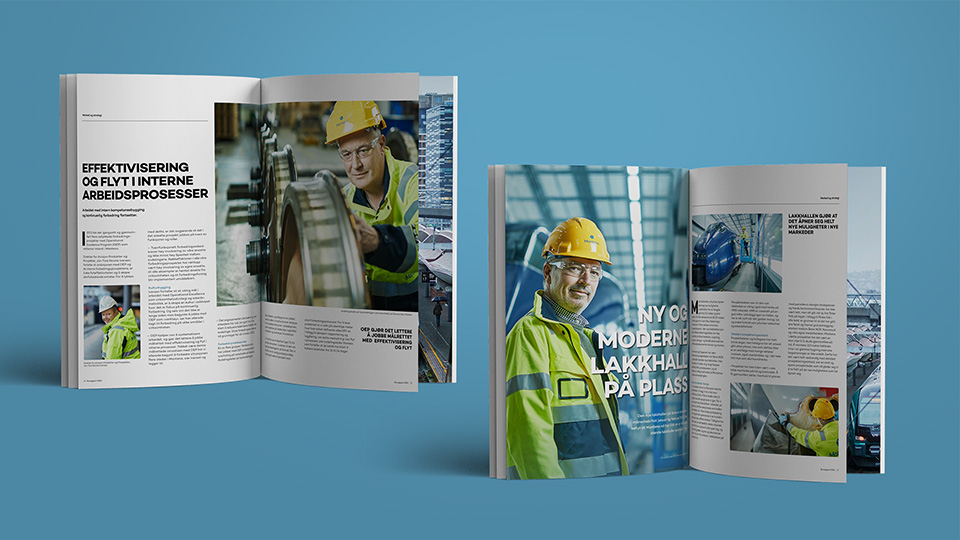
Mantena’s Annual Report for 2021 has now been published. The rail industry suffered during the pandemic and the impact was also felt by Mantena.
– We managed to cope through a tough year without receiving any COVID-19 business support from the government. Nevertheless, we have emerged from this period stronger thanks to our ability to adapt, says John Arne Ulvan, CEO of Mantena.
Mantena has had to make provisions for losses, while at the same time, streamlining initiatives have begun to pay off.
– The figures to-date this year are positive, so things are looking brighter, but we still have to be prepared to continue our transition while also handling the increased costs that the war in Ukraine has entailed, says Ulvan.
The importance of train maintenance
All trains must undergo regular, frequent rounds of maintenance in order to remain operational. For passengers, this ensures that trains are in the right place at the right time and safe to use. Mantena is the largest rail maintenance provider in Norway and is a vital part of the Norwegian railway. Mantena was previously part of the NSB family and is now owned by the Norwegian Ministry of Trade, Industry and Fisheries.
Enhanced competitiveness
Mantena won many contracts against tough competition in 2021. However, the company also recorded a negative financial result for the year. This is due to provisions for expected losses on contracts entered into earlier, challenges related to the pandemic and a need for further streamlining of operations.
– There is a lot to be gained from further innovation and optimisation of the railway. Our role as train maintenance provider means we are a key player in this process. Optimised maintenance allows us to extend the lifespan of trains and thereby reduce the cost to society. This is a vital contribution to the green shift. Trains should remain in service as much as possible and for as long as possible before new trains are built. The only way of ensuring this is through good maintenance, as well as preventing the need for spare parts, says Ulvan.
Measures were initiated through 2021 both to strengthen the company’s financial position and to increase competitiveness. The measures include an efficiency improvement programme which will help to reduce costs and substantially improve competitiveness over the next two years. We have also reviewed the contract portfolio and terminated several unprofitable agreements in 2021 and 2022.
COVID-19 and the war in Ukraine
The COVID-19 pandemic has left its mark on the rail sector. Fewer passengers have resulted in lower revenues for the rail operating companies. Trains have also been operated over shorter distances. This has affected Mantena’s revenues since trains are maintained at regular distance intervals and income is tied to this. This has meant that we have had lower revenues, while at the same time costs have remained the same, partly as a result of the ongoing need for contingency availability. Mantena has received no COVID-19 business support from the authorities.
The railway reform has already signified major changes to the maintenance industry. There is an altered contract regime in place that makes great demands in terms of cost cutting and efficiencies. Maintenance companies must now also incur losses in the event of unforeseen maintenance requirements or when trains are operated less than expected.
The war in Ukraine has resulted in rising energy costs. Now, the cost of train parts is also increasing. This is due to reduced availability and increased costs of production.
– Streamlining the system is a necessity, and Mantena is at the forefront of this work. We are currently implementing measures that allow us to save money both by cutting costs and working more efficiently. One great example of this is keeping spare parts in stock. In the past, a lot of capital has been tied up in our inventory of spare parts, which has generally been excessive in size. We have now reduced somewhat. We are also exploring opportunities to achieve better terms when purchasing, says Ulvan.
Green shift – and savings for society
Mantena has been at the forefront of highlighting how train maintenance regimes can deliver savings for society as a whole. This entails reviewing all maintenance requirements and looking at what is actually required at each service interval. The aim is to avoid unnecessary work and unnecessarily high levels of spare part usage. Additionally, trains can be utilised more efficiently as a whole by ensuring more “uptime” for each train set.
– We have taken the initiative to deliver this modernisation in terms of maintenance but making changes to the regime requires the whole industry to do its fair share too – we need the owners and operators of trains on board with us. This kind of modernisation has to be seen against the backdrop of the green shift and the move to a circular economy. Ideally, trains should be in service for as long as possible and have the longest lifespan possible, while at the same time reducing spare part usage. This demands good, efficient maintenance processes, concludes John Arne Ulvan.
